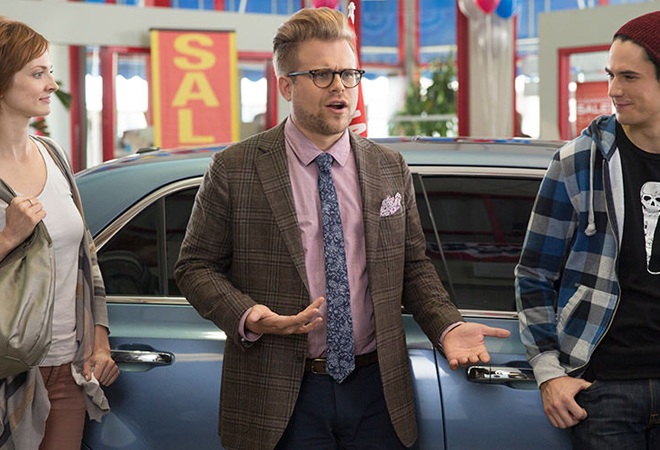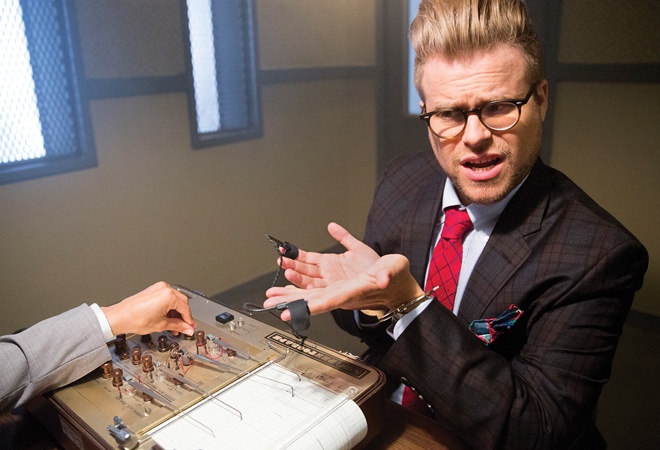Did you know that cars would be nearly two thousand dollars cheaper without dealerships? Or that the TSA doesn’t actually stop terrorist attacks? Or that tipping started as an unethical business practice and doesn’t accomplish what it claims to? There are hundreds of ideas like these that people assume are indispensable parts of daily life, yet, when you actually look a little closer, are recent additions to society.
In Adam Ruins Everything, Adam Conover attempts to end these common misconceptions and assumptions people take as “cultural furniture,” to borrow Conover’s phrase. The show started as a few videos he did for CollegeHumor, but was soon picked up as a full, thirty minute show. Conover’s an excellent host who comes off knowledgeable without being condescending or boring and his delivery takes the edge off of some of the worse news the show delivers. And believe us, there’s going to be some bad news.
The format follows generally the same template each episode, with Conover attaching himself to an exasperated but begrudgingly interested group of people and taking down social fallacies one by one. It’s an amusing relationship that takes a mildly pessimistic turn when you realize these people’s unwillingness to learn isn’t limited to the show and, instead, is the domineering social attitude toward change.

One of our personal favorite episodes was “Adam Ruins Cars.” Even though we’re huge fans of cars here at Cool Material, this episode was revelatory. Conover follows a man and his son through the experience of buying the son’s first car and the son’s first night out on the town.
A few highlights of the episode are the political corruption that made dealerships as powerful as they are, the planting of fake news stories that blamed pedestrians for automobile deaths, and the invention of traffic and the subsequent demise of the streetcar. Which, wait, traffic used to not be a thing? Why are we even still bothering with cars if there’s an alternative to traffic? There’s also the fact that whole cities were rebuilt around cars, which actually hurts the city, economically, socially, and environmentally and makes it harder for the poor to keep afloat financially.
But the great thing about the episode is that it ends with the idea that our corporately engineered dependence on cars is far from a foregone conclusion. Conover reminds us we can absolutely have vibrant urban spaces with robust public transportation and bustling public streets, if that’s what we want. He ends the episode by citing the recent Los Angeles initiative to improve its rail system and the success it’s been enjoying, saying that if LA can give up its cars, so can every other city.
In fact, no episode is ever defeatist, which is a major accomplishment for a show that claims it’s going to ruin most of the stuff we like the most. No episode says “everything sucks and there’s nothing we can do,” instead opting for a much more optimistic view.
An example of something small we can change, as opposed to the daunting task of reforming the country’s infrastructure, is canned food drives. Food banks ask that we give money instead of food since they can do more with a dollar than our old cans of soup. It’s a tiny change for us that’ll make a huge difference to them. We’re hard pressed to think of an episode that doesn’t end with a positive message similar to that, even “Adam Ruins Death.”
If you have any doubt as to the reliability of the show’s sources, Conover and his team are more than willing be transparent, which is more than can be said about the advertisers Conover is disputing. Citations are clearly displayed in the corner of the screen when a claim is made and, during each episode, there’s always a notification about the show’s website, which has pages and pages devoted to citations. There’s even a “For More on this Topic” section at the bottom of the page.

Overall, the show isn’t meant to stop a conversation, it’s meant to start and sustain one. Conover isn’t an infallible authority figure. He’s said himself that he wants people to question him and force him and his team to do more thorough research and refine their arguments. There are even points in certain episodes where Conover is proven wrong. Like “Adam Ruins Sex” where Emily Axford, of CollegeHumor notoriety, takes over the show to give an enlightening monologue about the female anatomy and the challenges women still face when it comes to sex and sexuality.
At the core of the show is Conover’s belief that there’s a need for more corrective institutions to combat the constant advertising and marketing we’re blitzed with every day. The show is returning for its second season, promising another 14 episodes of debunking and demystifying on top of the 12 from its first season. If you didn’t see the first season, it’s available online and on whatever on demand service you have, as well as a bunch of clips on the show’s YouTube channel. There’s very little plot running through episodes, so feel free to catch up in whatever order you deem most interesting. Season two starts up tonight, August 23rd, at 10 pm on TruTV.
Also, holy shit, stop breeding purebred dogs. It’s the worst possible thing you could do to a living thing.




